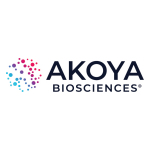
Akoya and Johns Hopkins’ Collaborative Agreement Supports Pioneering New Approach to Immunotherapy Biomarker Discovery and Validation
Astronomy and Pathology (AstroPath™) come together for the first time to discover and clinically validate new spatial phenotypic signatures using multiplex immunofluorescence.
MARLBOROUGH, Mass.--(BUSINESS WIRE)--Akoya Biosciences, Inc., The Spatial Biology Company®, today announced a collaboration with the Bloomberg-Kimmel Institute for Cancer Immunotherapy (BKI) and the Bloomberg Center for Physics and Astronomy at the Johns Hopkins University School of Medicine. The agreement brings together Akoya’s Phenoptics™ multiplex immunofluorescence (mIF) platform for spatial phenotyping and Johns Hopkins’ AstroPath™ platform, an interdisciplinary team of immunologists, pathologists, oncologists, and astrophysicists focused on immuno-oncology biomarker discovery and validation. As part of the collaboration, researchers will develop, validate, and clinically implement novel spatial phenotypic signatures for immunotherapy and facilitate more effective drug development using Phenoptics™ technology.

Immunotherapies utilize the immune system to combat cancer and are revolutionizing the field of oncology. Despite this great progress, most patients do not respond to immunotherapy, creating a pressing need for clinically validated biomarkers that accurately predict which patients are likely to benefit from a particular treatment.
A recent multi-institutional study found that mIF, which preserves the spatial context of cellular expression and whole tissue architecture, more precisely predicts response to immunotherapy compared to gene expression profiling, tumor mutational burden (TMB), and current single-marker immunohistochemistry1. The Phenoptics™ mIF platform provides an end-to-end solution with the reproducibility, sensitivity, and throughput needed to overcome the biomarker challenge by turning spatial data into actionable intelligence.
The AstroPath™ program applies an innovative approach to analyze large mIF datasets by using celestial object–mapping algorithms to rapidly identify optimized predictive signatures. The program leverages the principles of immunology, pathology, computer science, and astronomy to lay the foundation for rapid, efficient biomarker discovery. The real power of the AstroPath™ platform comes from the unique combination of knowledge and skills of the principals involved – Dr. Janis Taube, Director of the Division of Dermatopathology, Dr. Drew Pardoll, Director of the Bloomberg~Kimmel Institute for Cancer Immunotherapy, and Dr. Alex Szalay, Bloomberg Distinguished Professor in the Department of Computer Science, an avid astrophysicist and big data expert.
This collaboration lays out an integrated process for biomarker development from discovery to eventual clinical use. Johns Hopkins will receive support to further develop its AstroPath™ biomarker platform and Akoya will work with AstroPath™ and its partners to convert AstroPath™ discoveries to standardized high-throughput assays for clinical and translational studies. Together, the teams will help immuno-oncology groups within pharmaceutical and biotech companies take full advantage of biological information made available by multiplexed immunofluorescence, to accelerate development of new immunotherapies and commercialize predictive tests that can identify upfront those patients likely to respond to specific immunotherapies.
Cliff Hoyt, Vice President of Translational and Scientific Affairs at Akoya, commented, “We have worked closely with the Johns Hopkins team as they have refined multiplexed immunofluorescence methods and integrated them into their AstroPath™ platform. This paves the way for us to rapidly explore the deep spatial biology of whole tissue sections. Now, we look forward to making this method available to researchers developing new immunotherapies and to enable better stratification of patients once new biomarkers become validated and standardized.”
“Through the AstroPath™ collaboration, we have a unique opportunity to push the limits of our Phenoptics platform in the realm of spatial tissue exploration, and broadly disseminate the discoveries and inventions from a world-leading interdisciplinary team of experts at Johns Hopkins,” said Brian McKelligon, Chief Executive Officer of Akoya. “The results of this collaboration could help reshape the future of immunotherapy biomarker development.”
The latest findings from the AstroPath™ platform can be viewed in this virtual Science/AAAS presentation by Dr. Janis Taube and Dr. Alex Szalay.
About Akoya Biosciences
Akoya Biosciences, The Spatial Biology Company®, offers the most comprehensive, end-to-end solutions for high-parameter tissue analysis from discovery through clinical and translational research, enabling the development of more precise therapies for immuno-oncology and other drug development applications. The company has two industry-leading platforms that empower investigators and researchers to gain a deeper understanding of complex diseases such as cancer and other immune system or neurological disorders. The CODEX® system is the only benchtop platform that can efficiently quantify more than 40 biomarkers and is ideally suited for biomarker discovery. The Phenoptics™ platform is the only end-to-end multiplexed immunofluorescence solution with the robustness and high throughput necessary for translational research and clinical trials. For more information, please visit https://www.akoyabio.com/.
1Lu S, Stein JE, Rimm DL, et al. Comparison of biomarker modalities for predicting response to pd-1/pd-l1 checkpoint blockade: a systematic review and meta-analysis. JAMA Oncol. Published online July 18, 2019.
Contacts
Michelle Linn
Bioscribe, Inc.
774-696-3803
michelle@bioscribe.com
Editor Details
-
Company:
- Businesswire
